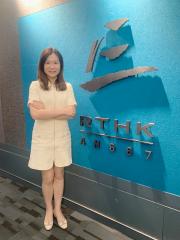簡介
Listen to #Hashtag Hong Kong every Sunday morning at 8.15
Focussing on issues affecting civil society, we'll hear from representatives of NGOs, associations, statutory bodies, and non-profit groups.
(Sundays 8.15am - 8.25am)
最新

Chris Leung, Social Worker, The Lok Sin Tong Benevolent Society
Hi everyone, I am Chris, the Deputy Centre-in-Charge of the Sham Shui PO Community Living Room of the Lok Sin Tong Benevolent Society, Kowloon.
According to the "Long-Term Housing Strategy - Annual Progress Report 2022," the government has secured sufficient land to build public housing units, fulfilling the supply targets for the next ten years. However, as the allocation of land for housing is not evenly distributed annually, only about one-third of these units will be completed in the first five-year period.
Hong Kong nowadays is facing a housing shortage, and many citizens would choose to live in subdivided flats. According to statistics released by the Census and Statistics Department in 2021, there are approximately 108,200 subdivided units for rent in Hong Kong, with an average of 3-4 partitioned rooms per unit. The median living space per person is only 56.5 sq. ft., lower than the 75 sq. ft. standard for public housing and the 161.5 sq. ft. for the average household in Hong Kong.
Apart from limited living spaces, subdivided units are also facing several problems like heavy water and electricity charges, safety issues, etc. The poor living environment has poses impacts on residents’ physical and mental health that most of them have to bear heavy financial burden and parenting.
In view of that, the Social Welfare Department (the "SWD") launched the "Community Living Room Pilot Scheme" funded by the Community Care Fund. The Sham Shui Po Community Living Room Project locates in Fuk Wa Street, Sham Shui Po, in where subdivided housing is concentrated. The Project focuses on supporting subdivided unit households, especially those with children, in order to alleviate the difficulties they face while waiting for public housing and living in poor conditions, and provide critical support during the transition period.
As a Government, Business, and Community tripartite collaboration project, the government has appointed THE LOK SIN TONG BENEVOLENT SOCIETY, KOWLOON, as the approved service organization to operate the Project, providing shared living spaces including pantry, dining room, living room, study and activity room, children's play facilities, fitness facilities, and self-service laundry facilities, as well as providing community information, health talks, After-school Learning and Support Programmes, community support and referral services. The Sham Shui Po Community Living Room has commenced operation since December 2023. It will operate for a period of three years. With the support of various sectors, the Project has already recruited over 500 families to provide them with services.
In this cross-sectoral collaboration project, not only could the users enjoy additional living space, but they could also broaden their social networks, thereby improving their quality of life and increasing their sense of community belonging. The after-school study support, provided by the Community Living Room, is aimed at alleviating pressure on parents to supervise their children’s homework. The project not only relieves the onus on parents as caretakers; it also lightens their housekeeping workload. Living in a relatively small and crowded flat, most of the users do not have space at home for a washing machine and need to wash clothes by hand. Now, however, they are able to make use of laundry services in the Community Living Room, which are available at an affordable price. User can build up their social network in the Community Living Room as well.
We will continue to actively expand the scope of services, and strive to help the sub-divided unit households in the Sham Shui Po district to improve their living space, sense of community belonging, and social networks after using the community living room facilities. In the long run, to elevate the living standards and enhance community belonging of grassroots citizens, we believe that with the participation of the business sector in setting up more Community Living Rooms in districts clustered with subdivided unit households, more grassroots families will benefit.
Three community living room projects in To Kwa Wan, Hung Hom and Nam Cheong are expected to commence operations gradually to provide support for subdivided unit households, particularly those with children. These four community living rooms are expected to serve 1,750 subdivided households, encompassing a population of around 270,000 individuals each year, to provide a better living standards for the residents.
And now I have a song I'd like to dedicate to all of you listening. My song is: "陪著你走” by Rubber Band
重溫
Dr Joey Chan, Secretary of the Hong Kong Society of Sleep Medicine and CUHK Associate Professor (Clinical) Department of Psychiatry, Faculty of Medicine, CUHK




















